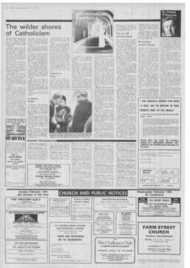Page 3, 13th February 1976
Page 3

Report an error
Noticed an error on this page?If you've noticed an error in this article please click here to report it.
Tags
Share
Related articles
No Comment Does Not Mean No Idea
Vatican
Vatican Woos Gaddafi
Church Seeks End To Libya Conflict
Benedict Greets Muslims
I foresaw problems right from the start
GERARD NOEL was in Tripoli for the Catholic Herald to cover the ChristianMuslim conference. Here is how he saw the talks.
LAST week's ChristianMuslim Conference in Libya left the Vatican in an embarrassing dilemma. It would either have to dissociate itself from certain supposedly agreed resolutions regarding the future of Israel, or suffer the righteous indignation of Jews all over the world, Dissociation has, in fact, occurred.
That some such dilemma would, at the end of the day, almost certainly emerge in one form or another was apparent to most people even before the conference began. I myself became aware of its seeming inevitability within hours of flying in to Tripoli on Friday of the week before last.
I was among the many — delegates. observers and journalists — who had gone to Libya as guests of its generous government for what might have been a historically constructive turning point in Muslim-Christian relations.
The generosity of our hosts was all the more appreciated in that it was extended with no strings attached and against the obvious possibility that Muslim strategy at the conference might well come under heavy criticism.
The fact is that preparations had long been in hand for the occasion to be a primarily political one, aimed at the mobilisation of world opinion against the State of Israel. To involve the Holy See in apparently lining up unreservedly against Israel was the main plank of the Libyan-Islamic strategy.
On this point there is no room whatever for doubt. Indeed, the host country made its intentions almost naively clear from the very start.
In vain, as it turned out, did Cardinal Sergio Pignedoli protest that his Vatican delegation had no intention of examining political issues, such as that of "Palestine," and that its intentions were to confine discussion to purely religious themes.
But for some time before the conference had started a special newspaper entitled "Islamic-Christian Dialogue" had been appearing weekly, printed in French and Arabic.
The edition published on the eve of the Vatican-Islamic meeting carried banner headline:, on its front page stating: "The Vatican Condemns Zionism."
This, however, turned out not to be a story relating to present attitudes, but a rehash of quotations going back to the early forties in which, with scant disregard for context, the future John XXIII, the then Vatican Secretary of State Cardinal Maglione, and Mgr Domenico Tardini were all shown as being lukewarm to the establishment of a Jewish national home, at least geographically, in what is now Israel.
Such past attitudes are well known, but have little or no bearing on the present situation.
The trap having thus been set, members of the Islamic team came back again and again, in the midst of largely abstract dissertations on religion, to such problems as those of Israel, Jerusalem and the Palestinians. The Holy See, it was urged, should have something to say on such matters under the heading of "Human Rights."
The team led by the Cardinal, who heads the Vatican Secretariat for Non-Christian Religions, was unsuccessful in keeping the dialogue on a purely religious plane.
A golden chance was thus, it seemed, being lost for a more genuine theological denoument between Islam and Christian traditions of thought.
In the event, two resolutions were read out at the end of the conference. One of these condemned Zionism "in so far as it is racism"; and the other denied, in effect, any right to occupy a city of purely Arab character such as Jerusalem.
The Holy See, it seemed, would now have to extricate itself from its former adherence to a policy of conditional support for Israel, falling short, as it does, of diplomatic recognition of Israel as a State at a time when its boundaries have not assumed the nature of internationally agreed frontiers.
The Vatican delegation had not, perhaps imprudently, asked to see translations of these resolutions before they were read out in Arabic.
What is clear is that Libya, under the leadership of Colonel Gaddafi, aspires to spearhead a new drive by the "Arah nation" to consolidate its political and religious em
Iire in a huge area of which srael is to have no part. The Tripoli attempt to drag in the Holy See as reluctant allies may well misfire through having been too crudely attempted; for when its full implications were realised the Vatican delegation quickly made it clear that it would have to refer the Israel and Jerusalem resolutions to "higher authorities, for their information."
The same delegation could meanwhile claim that some progress, at least, had been made in fields where the discussions had been kept in the strictly religious fields.
Cardinal Pignedoli made a personal hit with his dignity, charm and sincerity, and said he hoped that further dialogue would follow.
The other "star turn" at the conference was, of course, Libya's leader, Colonel Gaddafi himself. Whether or when he would actually attend any of the sessions was not known in advance. True to Bedouin tradition, it became clear that he would rely on the inspiration of the moment under the guidance of Allah.
It was that, without warning, late on the Monday afternoon, the paper being read by an Islamic delegate was interrupted by murmurs of "Gaddafi, Gaddafi!" as the charismatic and dashing young Head of State made his way into the auditorium.
Unexpectedly, he sat down in a vacant seat almost immediately behind where I myself was sitting. By reaching back and stretching I could have shaken him by the hand.
This gesture of sitting down with the audience naturally caused much more of a sensation than if he had accepted the invitation to come straight up to the platform. But Gaddafi is nothing if not a consummate showman.
The photographers meanwhile swarmed all round him (and literally on top of me) like giant flies with sharp antennae thrashing in all directions.
Then a path was made for Cardinal Pignedoli who came down from his place on the rostrum to greet the Libyan leader. It was an interesting moment, with one revealing result which probably no one in the entire building was aware of except those, like myself, who happened to be a few feet away, The Cardinal made a gesture to indicate that he would like to sit down next to "Brother Colonel." Gaddafi was taken aback and clearly did not want to share the inverted limelight.
Visibly thinking quickly, he made a flourishing gesture indicating that the Cardinal's rightful place was one of honour on the platform It was nevertheless a snub, as I could clearly see from the Cardinal's disappointed expression, though it cast a shadow over his face for only a split second.
After a short interval the Libyan leader joined the others on the platform and his questions and speech took up the rest of the evening.
All in all, it was an elaborate piece of political public relations on Libya's part which may prove to be counter-productive in the long run. It was extremely disappointing from the point of view of genuine ecumenical detente; but Cardinal Pignedoli landed himself and his delegation in a dilemma only because, in the final analysis, he tried so hard to be the perfect guest.
And the hostmanship of the Libyans, allowing for their almost obsessive preoccupation with political issues and their rabid anti-Zionism, could not be faulted from the point of view of willingness to please.
Their artless generosity covered a multitude of sins and overcame the suspicions of many that mild chaos is the normal state of affairs in this strange country, whose September Revolution, putting it on an entirely new road, occurred only seven years ago.
Showman Gaddafi is determined to show, complexes and all, that his "third way" owes nothing to either East or West, and that democratic dictatorship is possible under all the merciful providence of the God of Islam.
blog comments powered by Disqus









